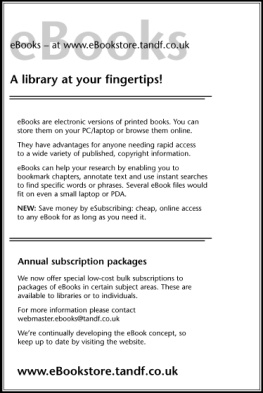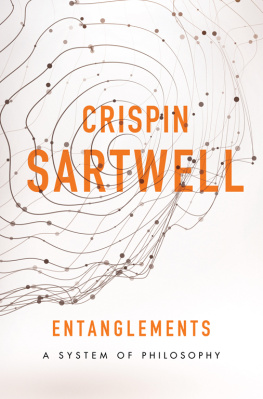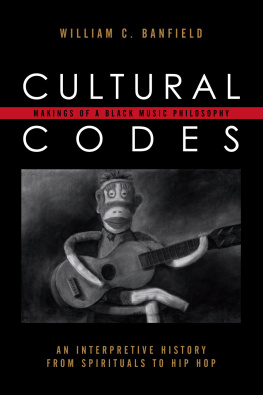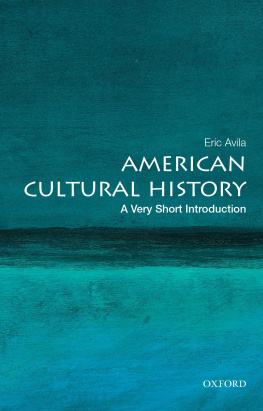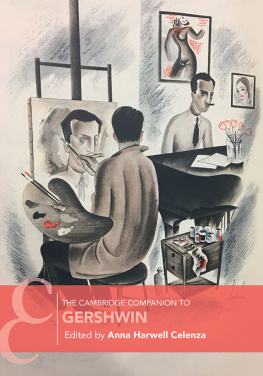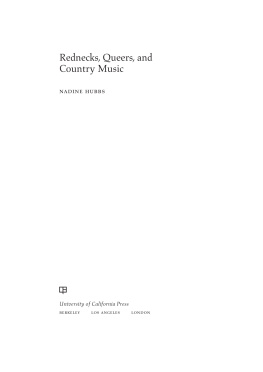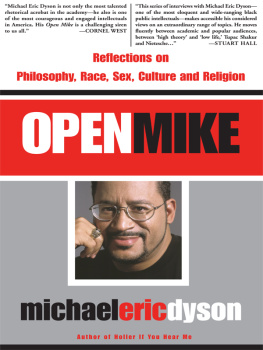Published by
STATE UNIVERSITY OF NEW YORK PRESS
Albany
2014 State University of New York
All rights reserved
Printed in the United States of America
No part of this book may be used or reproduced in any manner whatsoever without written permission. No part of this book may be stored in a retrieval system or transmitted in any form or by any means including electronic, electrostatic, magnetic tape, mechanical, photocopying, recording, or otherwise without the prior permission in writing of the publisher.
Excelsior Editions is an imprint of State University of New York Press.
For information, contact State University of New York Press.
www.sunypress.edu
Production and book design, Laurie Searl
Marketing, Michael Campochiaro
Library of Congress Cataloging-in-Publication Data
Sartwell, Crispin, 1958-
How to escape : magic, madness, beauty, and cynicism / Crispin Sartwell.
pages cm (Excelsior editions)
Includes bibliographical references.
ISBN 978-1-4384-5267-8 (hardcover : alk. paper)
ISBN 978-1-4384-5266-1 (pbk. : alk. paper)
1. Philosophy, American21st century.
I. Title.
B948.S271 2014
191dc23
2013034876
10 9 8 7 6 5 4 3 2 1
In loving memory of my father,
Franklin Gallagher Sartwell
Preface
The items here probably represent the light or fluffy side of my authorship, which might be unfortunate, because the light side is also a rather dark side. They range from a personal essay on addiction to a satire on race to an amazing solution to the question of the meaning of life itself or, thinking about it from another angle, to the question of the meaning itself of life, or perhaps to the question itself of lifes meaning.
The centrality of the arts for understanding historical and contemporary culture, and our coming rapture/damnation by comedy in the cynical ecstasy at the end of history: these are related underlying themes of many of these essays. Often I apply ideas and taxonomies from art history and aesthetics to various sorts of materials, for example to gender and sexual orientation, or to popular music forms, or to the structure of history, and then try to let the material remap those disciplines. I dont insist that any particular one of these essays constitute philosophy or aesthetics or anything else; Ive tried to follow from thing to thing, idea to idea, fiasco to calamity, rather than worry about where precisely I was in the disciplinary maze.
Some of these essays reflect engagement with stage and parlor magic and sleight of hand; a number discuss or obviously reflect obsession and addiction; a number display a lifelong love of popular music; a number reflect engagements with my favorite writers and questions about writing. All of these obviously have various autobiographical connections, and I suppose they are all attempts to determine what you can see from here, wherever here is now: including, white heterosexual middle-aged person; aficionado or enthusiast; daddy, American, me, etc. Im happy to let these connections emerge explicitly, or not.
As Ive gone on writing, I have tried to get less showboaty and more obviously committed to subject matters other than myself, though it might not seem that way. Nevertheless, I weaves in and out here, and I do think that even academic writingwhich this may be or notshould be more personal insofar as persons, with their passions and pathologies, still lurk behind it or create it in some way. The I changes in different essays, but I am not going to be precious about it: by I I mean me. I mean me perhaps at different moments or moods; certainly Detritus was written at a nadir, and Im doing better now, and would have something happier to say about myself. I am content even if uncomfortable leaving that essay as a trace of then. Its not, on the other hand, that Im a different person than I was in 2008. If only. But you know how we end up being transformed without meaning to be, under necessity, like ramshackle ships of Theseus.
Most of these texts were read in some form as lectures/multimedia extravaganzas; others were pitched to various sorts of publication with varying success. Thanks to the Theory and Art of Magic Conference, Slippery Rock University, Notre Dame, East Tennessee State, Southern Illinois, Concordia College, Cal State Chico, Oregon State, Gettysburg College, the Nordic Society for Aesthetics, Duquesne, the International Country Music Conference, and others who hosted me on occasions when this material was presented. Parts of pieces appeared in Harpers, the Los Angeles Times, The Rolling Stones and Philosophy, How Does It Feel to Be a (White) Problem?, and Tricksters and Punks of Asia. All the papers have been at least somewhat revised, though they are still to be taken as representing the time they were composed. For example, How to Escape was written before the killing of Osama bin Laden. In some cases, related blog entries from eyeofthestorm.blogs.com or related journalism by me from various sources have been annexed.
Near the end of his life, my father, Frank Sartwell, gave me editions of Menckens autobiography and Bierces Devils Dictionary with an air of passing on key bits of family lore. For him, as for his fatherboth newspapermen in DCMencken was the greatest of their own kind, or what they aspired to be: irascible, politically perverse, hilarious, hard-drinking bastards who knew everything, especially about writing. And Dad took me to see the Seldom Scene, Thursdays at the Red Fox Inn in Bethesda, Maryland.
For better and disaster, the effects of Judith Bradford and Marion Winik on the thought and prose style of this book, and the experiences represented, are obvious, at least to me. I think Arthur Dantos influence is pervasive; oh, probably Richard Rortys too. I read Heinrich Wlfflins Principles of Art History in high school and am still battering my old Dover edition; amazing how something like that can infest your thinking. Throughout, art historical concepts, stylistic characterizations, and terms designating periods (soul, for example, or classical) should be understood as sketched out in the lexicon, pp. 17991. Thanks to Andrew Kenyon for collaboration on this volume. The city of Baltimore and the countryside of south central Pennsylvania. The Maryland Institute College of Art and Dickinson College.
As usual, you should blame those people and institutions, rather than the author, for all the infelicities, fatuities, solecisms, barbarisms, contradictions, absurdities, and blunders you find here.


